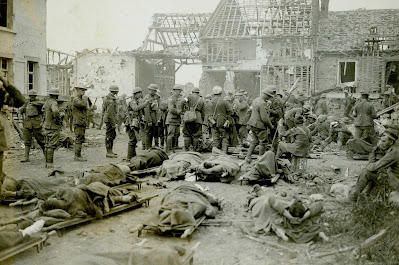 |
| Source: Wallpaper Abyss |
A number of things led to the outbreak of World War I, including the murder of Archduke Franz Ferdinand, the complex web of alliances, militarism, nationalism, and imperialism, as well as covert diplomacy and the failure of global efforts to keep the peace.
In the end, this struggle had a huge impact on history, bringing about important political and social changes all across the world.
The Role of Archduke Franz Ferdinand’s Murder in World War I
The murder of Archduke Franz Ferdinand was a key factor in the outbreak of World War I. The murder of Franz Ferdinand on June 28, 1914, at Sarajevo set off a series of circumstances that, by early August of that year, brought about the start of World War I.
Being the heir to the Austro-Hungarian throne, this incident incensed Austria-Hungary, and it sparked a chain of international events that eventually turned into a world war.
In addition to being a single occurrence, Franz Ferdinand's murder was part of a larger Serbian nationalist plot in which they believed that by killing him, they would succeed in their political objectives. This incident sparked a complicated web of alliances and conflicts between European nations, which ultimately led to the start of World War I.
In a sense, the killing of Archduke Franz Ferdinand started the war, but the underlying political and military unrest in Europe was what really turned this incident into a major world war. It's vital to remember that despite the assassination, the great nations' preexisting rivalries and alliances may have still led to World War I.
What Role Did the Alliance Play in the Start of the Conflict?
The formation of the First World War was significantly influenced by the alliance system. The Triple Alliance and the Triple Entente, two competing military blocs, were created as a result of this structure.
Germany, Austria-Hungary, and Italy made up the Triple Alliance, whereas the Russian Empire, the French Third Republic, and the United Kingdom of Great Britain and Ireland made up the Triple Entente. These nations were competitive and under tension as a result of this divide.
Over time, tensions between these two factions grew more intense, eventually sparking the start of the First World War. The alliance systems aided in establishing a climate where conflict may break out, at least provocation.
Impacts on the Global Geopolitical Environment
Empires fell, new countries were born, and borders were redrawn as a result of World War I's effects on the world's geopolitical landscape.
The Austro-Hungarian Empire vanished, and new nation-states were created as a result of this conflict, which had a huge impact on the geopolitical framework. Additionally, it caused country borders to realign all throughout the world, changing the geopolitical dynamics.
The Collapse of Empires: Numerous strong empires, including the Ottoman Empire, the Habsburgs of Austria-Hungary, the Hohenzollerns of Germany, and the Romanovs of Russia, fell as a result of World War I. These imperial structures eventually fell apart as a result.
Formation of New Nations:As old empires fell in the wake of the conflict, new states rose. The founding of Poland and Czechoslovakia are two notable instances that significantly altered the geographic makeup of Europe.
Redrawing of Boundaries: As a result of World War I, national borders were revised all around the world. This alteration of borders has a significant impact on the political and territorial structure of different regions.
Geopolitical Reshaping:Due to the conflict, the geopolitical landscape of the world underwent tremendous changes. The dynamics of power in the global arena were transformed by the fall of empires and the rise of new states.
How Did India Assist the British in the First World War?
The Indian Army contributed significantly to Britain's war effort during World War I.
The Indian Army's participation in World War I highlights the conflict's global scope and the important contributions Indian soldiers made to Britain's triumph. Their contributions and sacrifices played a significant role in shaping World War I history.
Indian Soldiers Deployment:In the Indian Army, which fought in World War I on behalf of the British Empire, more than a million Indian men were sent abroad. They participated in the war in a number of theatres, including Gallipoli, Palestine, Mesopotamia, Egypt, Belgium, East Africa, and France.
Volunteer Contribution: India sent an incredible number of volunteers to fight for the Allies, which significantly aided Britain's war effort. During the war, more than 1.4 million Indian soldiers and civilians aided Britain.
Theatres of Operation: In addition to Ypres, Neuve Chapelle, the Somme, and Passchendaele, Indian soldiers also took part in battles in other theatres. Approximately 1.5 million Indian soldiers served across all World War I theatres.
It's important to note, though, that there was some debate regarding India's support during World War I. There was criticism and disagreement as a result of the large number of Indians who volunteered to serve the British Empire as it continued to mistreat their own people.
Following the war, the British put harsh regulations on India, such as the Rowlatt Act, which increased dissatisfaction and tension in the nation.
Written by- Sneha Rani








0 Comments